Ahart Herbarium
Ahart Herbarium presents
All Things Botanically Related (Series)
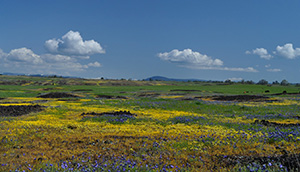
Table Mountain
Wildflowers of Table Mountain: Life between Rock and Water
by Samantha Hillaire
Environmental Lead, Consultant, and Author
Thurs, April 18, 2024
7pm - 8pm
Virtual Meeting (via Zoom)
Register for Zoom >> (opens in new window)
After registering, you will receive a confirmation email containing information about joining the meeting.
Every year, thousands of visitors traverse North Table Mountain Ecological Reserve in Butte County, California. Most are drawn to the spectacular patterned displays of native wildflowers that peak for a few weeks during each spring. Which species are responsible for these displays? And how do the climate, geology, and hydrology of the Table Mountain mesa combine to create these striking floral designs?
Samantha (Sam) Hillaire has worked as an environmental lead and consultant in northern California since the 2000’s. She fell in love with Table Mountain during a college field trip in the late 1990’s. In the following years, while working at nearby Butte College, she and her colleagues took on a mission to provide public education about the nature of this beloved local landmark – the culmination was the co-authored field guide, “Wildflowers of Table Mountain, a Naturalist’s Guide.” She currently resides in Chico with her husband, “Mr. Sam.”
All Things Botanically Related - Past Presentations:
Hog Lake vernal pool and Rancho Briesgau riparian restoration – Bureau of Land Management’s Sacramento River Bend ACEC
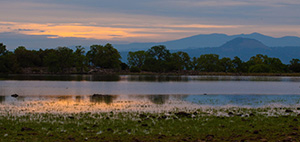
Biodiversity in the Lassen Foothills of California
by Steve Laymon
BLM Wildlife Biologist
and Brooke Thompson
BLM Ecologist/Botanist
Thurs, March 21, 2024
7pm-8pm
View Presentation Recording >>(opens in new window)
The Bureau of Land Management manages the Bend Area in northern Tehama Co. as an Area of Critical Environmental Concern. This 24,000 acre area along the Sacramento River extends from Turtle Creek on the south to Battle Creek on the north. This presentation features the Hog Lake vernal pool along Hwy 36 near Red Bluff and the Rancho Briesgau riparian restoration project along Battle Creek and the Sacramento River. Steve will talk about the flora of Hog Lake and environs and illustrate the flora with his photos. Hog Lake is the largest vernal pool on BLM managed land in northern California. Brooke will talk about the exciting new 160 acre riparian restoration project that is underway on BLM’s Rancho Briesgau. This project is being done in cooperation with River Partners with funding from The Wildlife Conservation Board.
California Phenology Thematic Collections Network
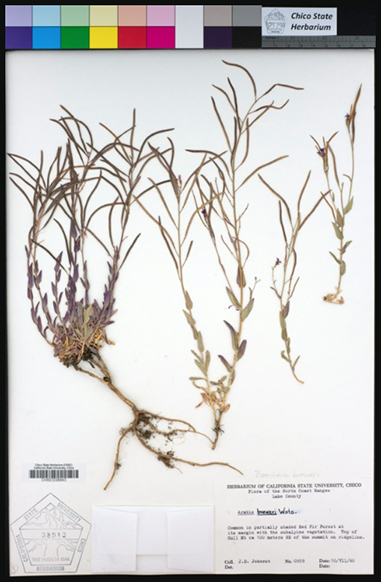 Ahart Herbarium is actively photographing specimens in the collection and linking the images to the collection information for each species. This information is accessible through the California Phenology Thematic Collections Network (www.CCH2.org(opens in new window)). Through a National Science Foundation grant, the Herbarium will be imaging over 30,000 specimens in the collection which will be similar to the one here. Collectively, over 23 different herbaria and collections across California will be located on CCH2. Check out the website!(opens in new window)
Ahart Herbarium is actively photographing specimens in the collection and linking the images to the collection information for each species. This information is accessible through the California Phenology Thematic Collections Network (www.CCH2.org(opens in new window)). Through a National Science Foundation grant, the Herbarium will be imaging over 30,000 specimens in the collection which will be similar to the one here. Collectively, over 23 different herbaria and collections across California will be located on CCH2. Check out the website!(opens in new window)
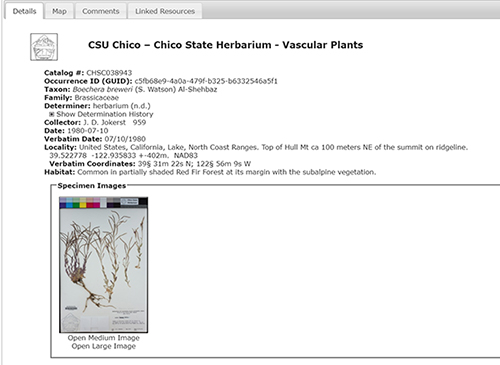
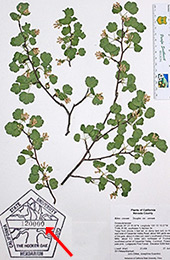
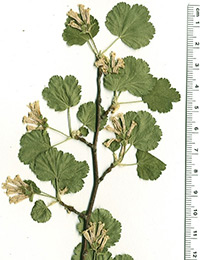
Ahart Herbarium passed another minor milestone by accessioning over 125,000 specimens – see the number 120,000 stamped in the middle of the Herbarium logo on the lower left side of the sheet in the left photograph. This specimen is another fine example of the collecting and specimen mounting of Lowell Ahart – his collection number 21,434 from last summer.
Located in Holt Hall room 129, the Herbarium is the most complete repository of plant specimens from northeastern California. The emphasis is on the northern California flora, and includes a great number of rare, threatened, and endangered plant species. Established with specimens donated by the late Professor Vesta Holt in the 1950's, the herbarium now contains more than 107,000 dried and mounted plant specimens. The majority of samples are flowering plants, conifers, and ferns, but bryophytes, lichens, and especially slime molds, are also well represented. The herbarium is used extensively for identification of sensitive and other plant species by various agencies and individuals. Loans of herbarium specimens are made to any higher academic institutions who request them.
Facilities available to visitors to the herbarium include the use of high-quality dissecting scopes, a compound microscope, an extensive reference library, an internet-connected computer, an internet connection for personal computers, and, with suitable training, access to the collection of specimens.
Users of the herbarium facilities and collection are encouraged to make plant collections during their field excursions and donate them to the herbarium. This is how the collection grows and increases its utility and importance to the whole botanical community.
Friends of the Ahart Herbarium Workshops!
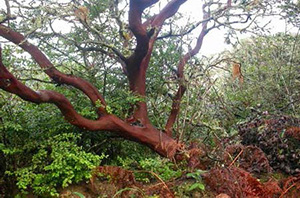
Introduction to Keying Manzanitas (Arctostaphylos, Ericaceae)
by Tom Parker and Mike Vasey
Saturday, May 4, 2024, 9am-4pm
A group considered difficult by many people, the 90+ California manzanitas are actually easy to identify once you understand the characters and how they vary. Tom Parker (Professor Emeritus of Biology, SF State) and Mike Vasey (Director Emeritus, SF Bay National Estuarine Research Reserve) will lead a one day workshop using keys from either The Jepson Manual, 2nd edition, or from their book, Field Guide to Manzanitas: California, North America, and Mexico, 2nd Ed., written by the instructors and Michael Kauffmann. Photos in the field guide help to illustrate and clarify differences among species. The class will focus on key taxonomic characters and some background context on manzanita evolution, distribution patterns, and ecology. Fresh material from different species will be used. Keying will be emphasized.
Bring either the new Field Guide (1st Ed. OK) or Jepson Manual. You should also bring a high-powered hand lens, 14x are best, but 10-12x also work. Feel free to bring fresh specimens with you; if you bring them, record presence or absence of a burl at the base of the stem, what the bark is like on the main stems, exact location and bring inflorescences with fruit if possible.
The workshop will run from 9:00-4:00 on Saturday, 4 May 2024, in Holt Hall room 129 at CSU, Chico. The registration fee is $110.00 personal, $130.00 business, $100.00 for members of the Friends of the Ahart Herbarium, and $50.00 for students (only 2 seats available at the student price). Please register in advance(opens in new window); class size limited to 18 participants (class cancelled without a minimum of 8 participants). For more information about the workshop content please contact Tom Parker at parker@sfsu.edu. For information about registration or to register using a credit card please contact the Biology office at (530) 898-5356 or sscholten@csuchico.edu.
Register online here >>(opens in new window)
New Calflora Tools for Your Native Plant Ventures and Adventures
by Cynthia Powell, Calflora's Executive Director
Tuesday, May 21, 2024, 9am-4pm
Please join Calflora’s Executive Director Cynthia Powell to learn about new Calflora tools for native plant professionals, gardeners, and enthusiasts! Calflora aggregates millions of plant observations across the state from thousands of sources and serves them to the public free of charge. These data sources include CCH2 (plant specimens from the California Consortium of Herbaria), iNaturalist, and CNPS plant checklists from around the state. How can you better use this incredible resource to learn more about regional plants?
At this presentation, Cynthia will cover Calflora’s planning your garden tool, specimen and other plant observations used in this tool, detailed plant ranges now available on Calflora’s species pages (for example, Grindelia stricta), population monitoring tools, and email alerts. She will also go over the important role botanists play in submitting and commenting on Calflora observations and checklists: if you see something, say something!
Hike! Following the presentation, Cynthia will lead a hike in Bidwell Park from 12:30 to 4 pm to demonstrate some Calflora tools in the field and to enjoy the park.
Cynthia Powell’s bio: After 3 years as Calflora’s GIS Project Manager, in 2016 Cynthia became Calflora’s Executive Director. She graduated with her MS in GIS (Geographic Information Science) in 2010 forecasting Mokelumne River water supply based on MODIS remote sensing snowpack images. She’s been examining what was under that snow — plants — ever since. She coordinates all Calflora programs, research, outreach, and advocacy, as well as fundraising and project management.
The workshop will be held on Tuesday, 21 May 2024, from 9:00‐4:00 in Holt Hall room 129 at CSU, Chico, with a lunch break from 11:30‐12:30, following by a hike until 4. The registration fee is $110.00 personal, $130.00 business, $100.00 for members of the Friends of the Ahart Herbarium, and $50.00 for students (only 2 seats available at the student price). Please register in advance; class size limited to 20 participants (class cancelled without a minimum of 8 participants). For more information about the workshop content please contact Cynthia Powell at cpowell@calflora.org(opens in new window). For information about registration, contact the Biology office at (530) 898‐5356. If registering with a credit card, please follow instructions listed in the online registration form(opens in new window).
Register online here >>(opens in new window)
View the Friends of the Herbarium Calendar >>(opens in new window)
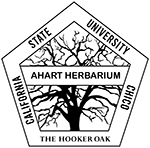
Ahart Herbarium is again open to the public!
Regular hours are Fridays 9:00 am to 5:00 pm, and by appointment.
Visiting the herbarium is by appointment only, by contacting the Curator at ljaneway@csuchico.edu.
Visitors accessing campus facilities must comply with CSU Chico vaccination policy.
Thank you.

